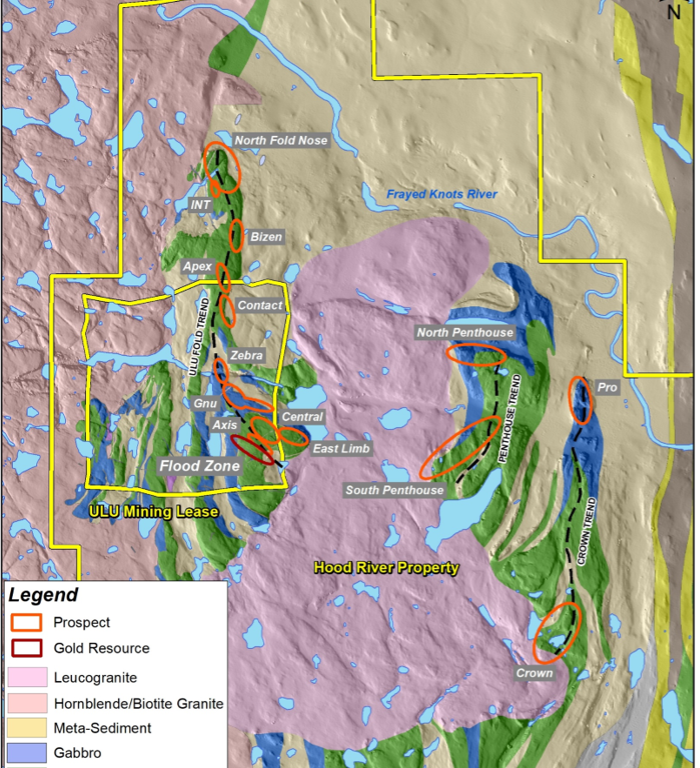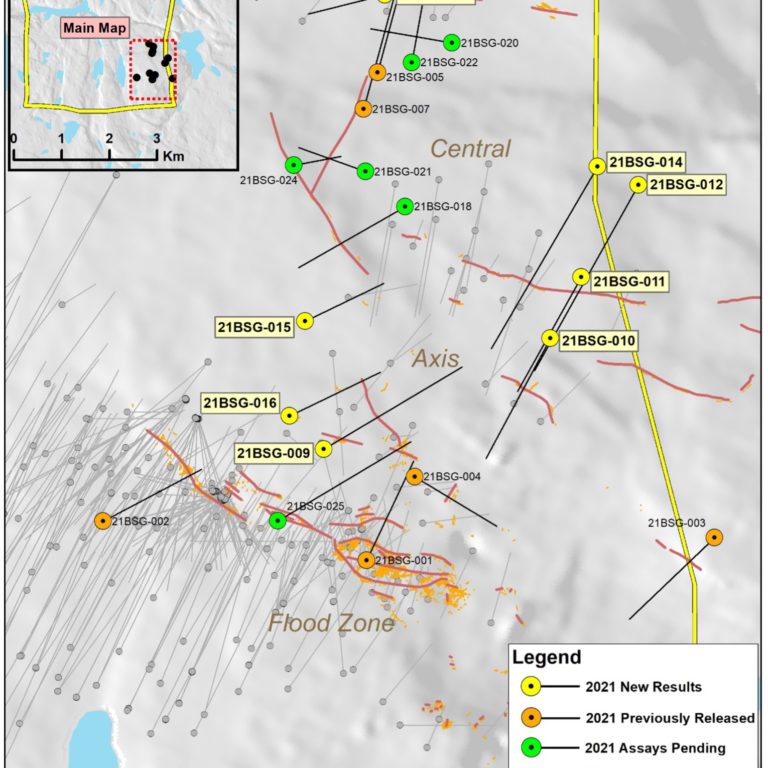Highlights:
- Blue Star increases Roma Project area by 89% to a total of 145.2 square kilometres
- Blue Star is the dominant landholder in the highly prospective HLGB, now controlling over 50 km of the prospective terrain of the Belt with its Ulu, Hood River and Roma Projects combined
- Agnico Eagle controls the ground contiguous to both the Hood River and Roma Projects, and is the only other significant landholder in the Belt (see Figure 1)
- In addition to drill ready targets at Roma Main, five new prospective target areas at North Roma and four new target areas at South Roma have been identified following the recently completed geochemical sampling program
CEO Grant Ewing stated, “Our Ulu Project hosts the high-grade Flood Zone deposit and is a great core asset for Blue Star however we are also taking advantage of opportunities that are accretive to the project as a whole. Consolidating a significant land position in the north part of the High Lake Greenstone Belt immediately adjacent to the High Lake VMS deposit and having drill ready targets transforms Blue Star into a regional player.”
Roma Project Summary
Following the increase in landholdings announced today, the Roma Project area now encompasses 145.2 square kilometres of highly prospective mineral claims in the HLGB. At Roma Main there is a mineralized quartz vein measuring up to 3.0m wide traceable for approximately two kilometres. Results include grab samples to 126 g/t gold and an intersection of 12.38 g/t gold over 2.31m from limited drilling. At Roma Fold, there is a mineralized 1.0 – 2.5m wide quartz vein traceable for 350m in an anticlinal sequence of basalt and sediments. Surface sampling returned gold values up to 5.6 g/t gold but this showing was never drilled.
The structural setting and mineralization style of Roma Fold are similar to the high-grade mineralization that occurs at the Flood Zone deposit on the Company’s Ulu Project located 48 kilometres due south (see News Release dated February 18, 2021 for more details).
“Last explored roughly 25 years ago, the limited Roma field program in 2021 conducted familiarization traverses, mineralized showing checks and undertook some preliminary geochemical surveying. Given the limited work, the Roma Main showing is considered drill-ready and the initial geochemical surveys are indicative of additional previously unsampled potential target areas. I am excited that such a limited work program indicates solid potential for near term discovery on the Roma Project,” commented Darren Lindsay, Vice President Exploration.
2021 Exploration Program
Blue Star initiated its 2021 exploration program on June 23 with a geophysics campaign, a drill campaign starting on July 16th, and surface exploration on August 1st and successfully completed all phases of the program in September.
The Exploration campaign evaluated several high priority targets in the area of the known high-grade Flood Zone Gold Deposit on the Ulu Project, and on high potential targets along the Ulu fold hinge. Numerous priority targets exist along the 5 km long Ulu Anticline which extends from the Flood Zone Deposit onto the contiguous Hood River Project up to the North Fold Nose Zone.
Targets considered high priority on the Hood River and Roma Projects had basic initial exploration campaigns to better understand host geology, confirm structures and existing anomalous zones and undertake initial geochemical surveys to determine potential to generate additional targets of interest.
Objectives of the 2021 program include better understanding the controls of higher-grade zones within the hosting structures, evaluating additional structures on and adjacent to the Ulu fold hinge, and defining additional targets for potential near-term discovery. The balance of the assay results from the program will be reported as they are received. The slow turnaround of assays results from the lab is an issue facing the entire sector due to covid related disruptions and the high level of mineral exploration in Canada.

Figure 1: Location map of the consolidated Roma Project Area.

Figure 2: Initial geochemical survey results (a) North Roma and, (b) South Roma Project Area indicating ‘open’ anomalous trends.
See the Company’s website for a detailed discussion of the Roma geochemical results.
Qualified Person
Darren Lindsay, P. Geo. and Vice President Exploration for Blue Star, is a Qualified Person under National Instrument 43-101 (“NI 43-101”) and has reviewed and approved the technical information contained in this news release.
About Blue Star Gold Corp.
Blue Star is a gold company focused on exploration and development within Nunavut, Canada. The Company owns the Ulu Gold Property lease, an advanced gold project, and the highly prospective Hood River Property that is contiguous to the Ulu mining lease. With the recently expanded Roma Project, Blue Star now controls approximately 27,000 hectares of highly prospective and underexplored mineral properties in the High Lake Greenstone Belt, Nunavut. A significant high-grade gold resource exists at the Flood Zone deposit (Ulu lease), and numerous high-grade gold occurrences and priority targets occur throughout the Ulu, Hood River and Roma Projects.
Blue Star is listed on the TSX Venture Exchange under the symbol: BAU, on the Frankfurt Exchange under the symbol: 5WP0, and on the OTC under the symbol: BAUFF. For information on the Company and its projects, please visit our website: www.bluestargold.ca.
For further information, please contact:
Grant Ewing, P. Geo., CEO
Telephone: +1 778-379-1433
Email:
Neither the TSX Venture Exchange nor its Regulation Services Provider (as that term is defined in the Policies of the TSX-Venture Exchange) accepts responsibility for the adequacy or accuracy of this Release.
CAUTIONARY NOTE REGARDING FORWARD-LOOKING STATEMENTS AND INFORMATION
This press release contains “forward-looking statements” within the meaning of applicable securities laws. Forward-looking statements can be identified by words such as: “anticipate,” “intend,” “plan,” “goal,” “seek,” “believe,” “project,” “estimate,” “expect,” “strategy,” “future,” “likely,” “may,” “should,” “will” and similar references to future periods. Examples of forward-looking statements include, among others, statements we make regarding prospective income and revenues, anticipated levels of capital expenditures for fiscal year, expectations of the effect on our financial condition of claims, litigation, environmental costs, contingent liabilities and governmental and regulatory investigations and proceedings, and estimates of mineral resources and reserves on our properties.
Forward-looking statements are neither historical facts nor assurances of future performance. Instead, they are based only on our current beliefs, expectations and assumptions regarding the future of our business, future plans and strategies, projections, anticipated events and trends, the economy and other future conditions. Because forward-looking statements relate to the future, they are subject to inherent uncertainties, risks and changes in circumstances that are difficult to predict and many of which are outside of our control. Our actual results and financial condition may differ materially from those indicated in the forward-looking statements. Therefore, you should not rely on any of these forward-looking statements. Important factors that could cause our actual results and financial condition to differ materially from those indicated in the forward-looking statements include, among others, the following: economic and financial conditions, including volatility in interest and exchange rates, commodity and equity prices and the value of financial assets, strategic actions, including acquisitions and dispositions and our success in integrating acquired businesses into our operations, developments and changes in laws and regulations, including increased regulation of the mining industry through legislative action and revised rules and standards applied by the regulatory bodies in Nunavut, changes in the price of fuel and other key materials and disruptions in supply chains for these materials, closures or slowdowns and changes in labour costs and labour difficulties, including stoppages affecting either our operations or our suppliers’ abilities to deliver goods and services to us, as well as natural events such as severe weather, fires, floods and earthquakes or man-made or other disruptions of our equipment, and inaccuracies in estimates of mineral resources and/or reserves on our mineral properties.
